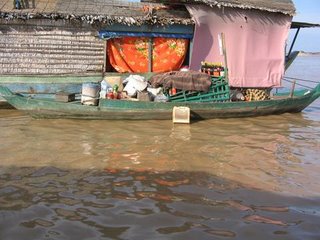
On the day one of our trip to Ankhor we were taken on a boat ride on the Tunle sap lake. We had arrived at Siem Reap at 12 noon and after lunch we set out for the ride. I had heard so much about the temple ruins and the Ankhor wat and other temples, I wanted to see them and I was wondering what is there to see in a lake.
We were taken to a canal in a bus. We had to travel on a very muddy and uneven road. We were transferred to a motor boat. A small boy was helping the driver of the boat in navigating the boat using a long oar. We were asked to be careful, keep our hands inside as there were other boats which were manoeuvring in the other direction very near our boat.
The guide was talking non stop about the old kings and the new political kings while I was wondering about the whereabouts of the lake.
Suddenly there appeared a huge lake dotted with lot of stationery swaying boats.
The guide told us that this is a special lake, which makes the direction of a river change. I simply could not comprehend. Then he explained. This lake which we were visiting in the dry season is fed by the waters of the river Mekong which flows from the base of Himalayas (Tibet) to the capital Phnom penh. During rainy season which starts in May and continues for 6 months the level of this lake increases and some where in October due to the increase in the level the water reverses and the Mekong river goes back from here to Phnom Penh.
The roads on which we rode in the bus which were lined with trees including mango trees on both sides, will be completely submerged in water during rainy season when the water level increases upto 9 meters that is well above those trees. The trees come out unscathed after the water recedes.
Lots of fish are brought into the lake from the Mekong and the fish find a good breeding place in the submerged trees . Hence the abundance of fresh water fish here is one of the highest in the world.
Once the water starts receding the whole area is so fertile that they grow the rice crop by just sprinkling the seeds without the need for ploughing or even replanting.
We could find two colonies or group of boat houses in the lake. The guide saod that one side i viet namese and the other combodians. We could see lot of boats with rooms with curtains, kitchen and even small gardens. We even saw a pig pen attached to a boat with few pigs in it!
Natural question was what will happen to the houses in these waters when the water level increases. He said the houses are either boats or they are built on bamboos which are tied together. So these people move their houses as the water level increases are decreases. Then only we noticed that virtually the boats were on leash tied to some stick like arrangement lest they move away in the wind. He said the lake will fillup the whole area upto the base of the hill which we could see a little distant away and the people will move there houses accordingly. We could see some shops also selling some items for the people living there.
We were taken to a shop which had a viewing platform as well as shops with local artefacts. This also had a small crocodile and a fish farm!
The guide had told us not to encourage beggars as they are trained to beg and are not sent to schools. We saw a little boy tagging along in our boat begging with tears in his eyes. when the boat picked up speed to our astonishment he jumped from the boat and we could see his head pop up in a little distance away.
Survival! Kids learning to swim in water automatically , as we learn to walk. It is hard to imagine living one's whole life in water where you keep shifting your house every now and then.
This was just a slum in a big lake. But the seasonal changes, which the guide explained and the guides narration made the visit a worthwhile visit.
I would like to visit this place in rainy season and see the area as our guide mentioned it is unrecognizable and this place needs two sets of maps one for dry season and one for rainy season.
I find it so difficult to understand the concept of changing direction of the river I would like to physically see the river changing the direction and moving the other way.
1 comment:
No wonder they say travelling aids learning. Who would have imagined lakes aiding rivers to change course?
Post a Comment